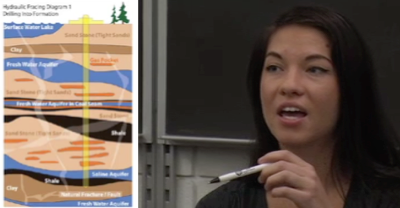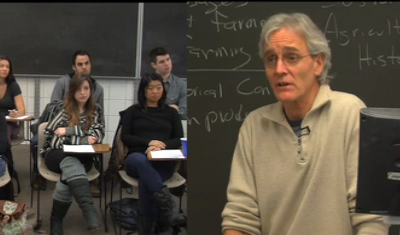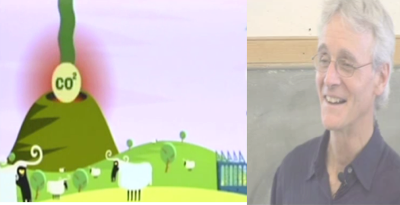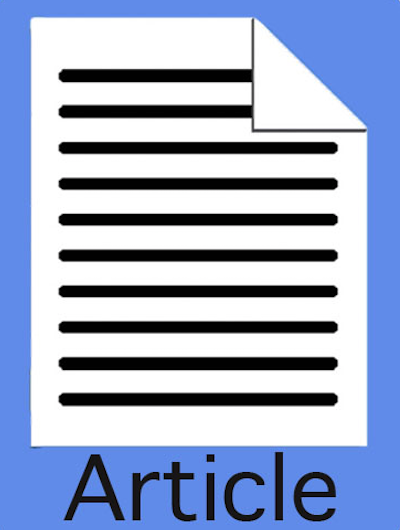Your Search Results (1006) sorted by newest
Workers Unite!
Media literacy and critical thinking lesson using four short song excerpts to compare songs with messages about worker organizing.
This lesson is part of a "kit" or collection of media decoding lessons on a particular topic. You can explore that kit using the link below:
Unit: Early Labor MovementKit: Media Constructions of Social Justice
30-60 Minutes
Working for Peace, Working for Justice
Media literacy and critical thinking lesson using diverse media imagery to teach about the interconnections between U.S. peace and social justice movements by examining the lives of five peacemakers.
This lesson is part of a "kit" or collection of media decoding lessons on a particular topic. You can explore that kit using the link below:
Unit: Peace IntroductionKit: Media Constructions of Peace
30-60 Minutes
World War II D-Day - Two Views of History: Soviet and American
This is a media literacy and critical thinking activity in which students decode U.S. and Soviet history texts for conflicting perspectives about D-Day and the liberation of France.
30-60 Minutes
World War One Through Posters
Media literacy and critical thinking lesson analyzing messages about economics in World War One posters.
This lesson is part of a "kit" or collection of media decoding lessons on a particular topic. You can explore that kit using the link below:
Playlist: The U.S. at War and Peace: American Revolution to the War in IraqKit: Economics in U.S. History: A Media Literacy Kit
30-60 Minutes
YouTube Recommendations: What Do I Do?
In this media literacy activity students analyze results from a YouTube recommendations list for messages about how to select videos based on the likelihood of their offering credible information.
15-30 Minutes
YouTube Recommendations: Who’s Steering Your View?
In this media literacy activity students analyze three online articles for messages about the impact of YouTube recommendations on viewers.
30-60 Minutes
Young People Taking Action to Protect our Warming Planet
This is a media literacy and critical thinking activity in which students analyze four short excerpts from online articles for messages about youth activism for environmental protection and social justice.
This lesson is part of a "kit" or collection of media decoding lessons on a particular topic. You can explore that kit using the link below:
Playlist: Climate Change
30-60 Minutes
Youth Activism
Media literacy and critical thinking lesson using four short film excerpts to reflect on the role of young activists in the black freedom/civil rights movement.
This lesson is part of a "kit" or collection of media decoding lessons on a particular topic. You can explore that kit using the link below:
Unit: Black Freedom/Civil RightsKit: Media Constructions of Social Justice
30-60 Minutes
Youth, Hip Hop & Climate Change
This is a media literacy and critical thinking activity in which students analyze two short hip hop music video to compare different approaches to encourage youth activism to deal with climate change.
15-30 Minutes
“The Truth About Coronavirus” - Google Searching For COVID-19
In this media literacy activity students analyze results from two Google searches, one for “coronavirus” and one for “the real truth about coronavirus,” to reflect on the impact of search terms on the sources that Google recommends.
15-30 Minutes
Storming the Capitol: Front Page Constructions
In this media literacy activity students analyze newspaper front pages for messages about media representation of the storming of the Capitol.
15-30 Minutes
Two Views of an Insurrection: January 6, 2021
In this media literacy activity students analyze the choices made in constructing two news reports on the January 6, 2021 storming of the U.S. Capitol and how we interpret the bias of each.
15-30 Minutes
Standards Alignment: National Media Literacy Alliance Joint Statement on Media Literacy Education
This 3-page document briefly summarizes the alignment of media literacy with the core standards for each of the following disciplines: library (AASL + YALSA), technology (ISTE), Journalism (JEA), Early Childhood (NAEYC), Social Studies (NCSS), ELA (NCTE), Math (NCTM), Science (NSTA), and Writing (NWP).
Download
Media Literacy Lesson Design
Lesson Elements
Lesson Conception
Social Studies
English Language Arts
Health
Science And Environment
Math
Arts
Psychology
Briefing: Project Look Sharp's Decoding Media Constructions and Sustainability
Antonio Lopez, in his coda to Greening Media Education, summarizes the complex set of skills needed “to bring ecologically oriented cultural practice into the realm of media education (which) promotes systems thinking, collaborative learning, critical thinking, lifelong learning and digital media literacy.” This article offers cases studies of two Look Sharp lessons, one for elementary age students and another for upper level high school, each of which was designed with these skills in mind as a way to bring Lopez’s vision into practice in the classroom.
College Level: Hydrofracking, Media and Credibility
Related to kit: Media Constructions of Sustainability: Fingerlakes
This 9 minute annotated video demonstrates constructivist media decoding using the lesson "Exploring the Impact of Hydrofracking on Aquifers," where college students analyze pro and anti-fracking diagrams.
View
Constructivist Media Decoding
Critical Thinking And The News
Assessing Credibility & Bias
Document Selection
Question Design
Social Studies
Science And Environment
College Level: Farming, Community and Sustainability
Related to kit: Media Constructions of Sustainability: Food, Water, and Agriculture
An example of leading a class through a constructivist media decoding using a lesson from our kit, Media Construction of Sustainability. Students in this video examine clips from a film and a commercial to decode farming in the US.
View
Constructivist Media Decoding
Social Studies
Science And Environment
High School Science: The Great Global Warming Swindle
An example of leading a class through a constructivist media decoding using a lesson from our kit, Media Constructions of Global Warming. Students analyze a short video clip from the film The Great Global Warming Swindle, compare the information in the clip with a chart, and reflect on issues of credibility and bias in media representations and our own biases when evaluating information.
View
Constructivist Media Decoding
Critical Thinking And The News
Assessing Credibility & Bias
Science And Environment
Sustainability Education and Media Literacy
Related to kit: Media Constructions of Sustainability: Food, Water, and Agriculture
This article looks at how the topic of climate change can often provoke deep emotions in students, and suggests that instead of shying away, teachers should use media literacy activities to foster discussions of what the future holds. The author stresses the importance of connecting to the emotional lives of students when raising the complex issues around sustainability.
Download
Media Literacy Lesson Design
Youth Culture And New Technologies
Do No Harm
Question Design
Social Studies
Science And Environment
Credibility, Information and Science
Designed for secondary science and environmental studies teachers, this 2 hour to full day workshop will explore the role of the internet and other media on our students understanding of information.
View
Constructivist Media Decoding
Media Literacy Lesson Design
Assessing Credibility & Bias
Science And Environment
Media & Health Issues
Media literacy education is a powerful way to approach the impact of media use and media messages on a wide range of health issues for today’s youth by emphasizing media analysis, critical thinking, and self-expression. This 2-hour to full day workshop can address multiple health issues or focus specifically on one of them, including: nutrition, body image, advertising, alcohol and substance use, smoking, bullying and put-downs, safety, and teen sexuality.
View
Constructivist Media Decoding
Youth Culture And New Technologies
Media Violence And Conflict Resolution
Do No Harm
Social Studies
Health





.png)





.png)






